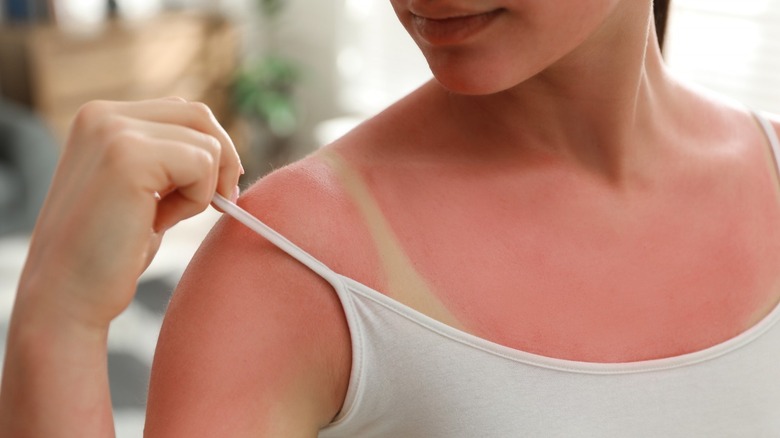The First Thing You Should Do When You Get A Bad Sunburn
If you tend to get painful sunburns, you're not alone. According to a 2020 survey conducted by the American Academy of Dermatology (AAD), a majority of Americans reported that they have been sunburned bad enough that it has impacted their daily life, with 60% admitting that their sunburns made wearing clothes uncomfortable. For 43% of the respondents, their sunburns have been severe enough to prevent them from sleeping.
Given these statistics, it should come as no surprise that experts at the AAD say that skin cancer is the number one cancer in the country. Roughly 9,500 Americans are diagnosed with some form of skin cancer every day, and 20 people die daily from melanoma seen in cancerous moles.
"As dermatologists, we know that unprotected exposure to the sun's harmful UV rays is a major risk factor for skin cancer," said board-certified dermatologist Bruce H. Thiers, M.D., FAAD, and AAD president. "It only takes a few simple steps to protect yourself from the sun, and it can reduce your risk of getting sunburns, skin cancer, and premature skin aging, such as wrinkles and age spots," he added.
Preventing and treating a bad sunburn
So what's the first thing you should do when you realize your skin is throbbing and as red as a lobster? "Get out of the sun right away and get your skin cooled down," dermatologist Melissa Piliang, M.D., tells the Cleveland Clinic. She also advises taking a cool shower or bath to lower your skin's temperature; however, she points out that you should make it brief because too much water will dry out your skin. If the burn is in one spot, she suggests gently applying a cold, wet compress to the afflicted area. Next, while your skin is still cool and wet, slather on moisturizing cream to seal in the moisture.
Other remedies you should have on hand that can reduce discomfort and pain resulting from a bad sunburn include aloe vera gel, 1% hydrocortisone cream, and pain relievers such as ibuprofen, naproxen, or aspirin to help with inflammation. However, be sure not to apply petroleum jelly. This can trap the heat of sunburn. And avoid creams with alcohol and topical treatments like lidocaine, which can cause more inflammation. Dr. Piliang also advises that you stay well hydrated, as sunburns can cause a reduction in fluids in other areas of your body.
To prevent sunburn in the first place, the Centers for Disease Control and Prevention (CDC) offers a number of easy and practical tips, including staying in shade, applying and re-applying sunscreen with a minimum SPF of 15, and wearing clothing and wide-brimmed hats that protect against damaging ultraviolet (UV) rays.


